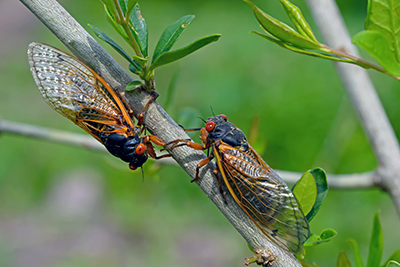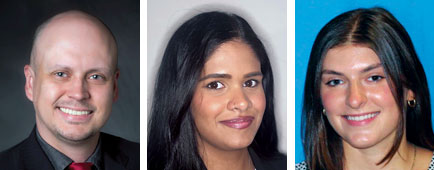This month and into next month, nearly a trillion guests are coming, and we are not prepared. A massive number of North American cicadas will emerge from underground in a rhapsody of noisy and pervasive mating activity. The good news is that you don’t need to get the guest room ready—they won’t be here long. The concerning news is that for the nearly 5.5 million individuals in the United States who have autism spectrum disorder (ASD) and experience sensory sensitivities, these visitors may quickly become overwhelming.
Cicadas are categorized into separate groups called broods, which dig out from their underground habitat every 13 to 17 years, as part of their natural lifecycle. This summer is marked by the rare occurrence of a double brood, when both 13- and 17-year broods will emerge simultaneously with estimates of over one trillion cicadas crawling out of their burrows. Once above ground, males will start singing “in chorus” to attract females. While largely harmless, their sheer numbers and continuous, loud, and high-pitched buzzing sound can become overwhelming to individuals with sensory sensitivities, including those with ASD and particularly those who already experience hyperreactivity and hypersensitivity to sound.
Despite being well described in both research and firsthand accounts, sensory overload in individuals with ASD is not completely understood. To date, “enhanced central gain” refers to the most well-supported theory for why noises can be so problematic, which describes the phenomenon in which individuals experience increased responsiveness to auditory stimuli. The implications of this increased responsiveness are not benign. In one survey, background auditory stimuli were noted to be particularly “stressful and exhausting” to autistic participants in health care settings. Increased responsiveness manifests differently depending on the individual but commonly results in agitation, emotional distress, and physical discomfort. The pending cicada swarm may become greatly intensified for those already experiencing sensory overload.
We can’t stop the cicadas and their biological cycles, and we shouldn’t want to. However, as we continue to learn to live with our natural environment, we must not forget about individuals with ASD who may have a harder time adjusting to these noisy visitors.
In 2021, the
Cincinnati Center for Autism encouraged the use of social narratives to prepare children with ASD, sensory conditions, or anxiety to develop coping skills for the cicadas. The center recommended framing the event in a positive light, by explaining its rarity and uniqueness, or assuring children that the cicadas’ noise is temporary. Another approach is for individuals to begin desensitizing themselves to the cicadas’ sound through exposure. Once the cicadas do arrive, parents and caretakers can stay vigilant for and be responsive to the signs of noise hypersensitivity. These are often nonverbal and might include covering ears, avoiding situations where an irritating noise can be found, and becoming distressed without a clear trigger. Another step to take may be to wear headphones/earplugs when outside or even reduce the amount of time spent outside.
While overlapping broods are rare, we can’t ignore their impact, especially for those whose existing mental health conditions may be exacerbated by the cicadas’ presence. As a society, we have the opportunity—and a moral imperative —to best support those most affected.
Collectively, practitioners, health care workers, and individuals can spread awareness so that individuals with ASD and the caretakers of children with ASD can take steps to prepare for the cicadas’ arrival. We can also prioritize showing compassion and patience to those impacted, especially when those impacts are invisible to others. Among all the ruckus of these benign bugs, let's take steps to hear and help the unheard, even when the noise gets loud. ■


